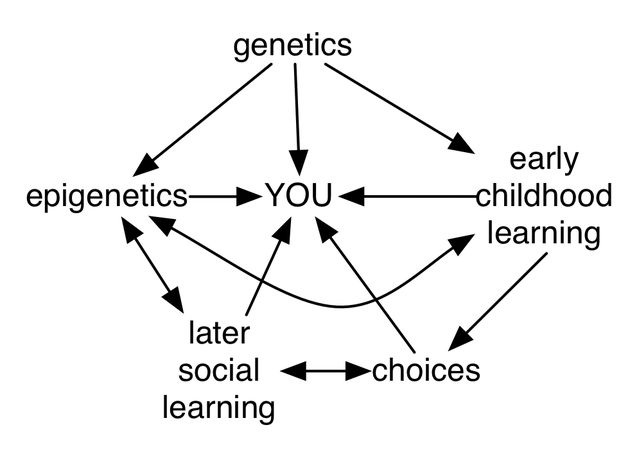The ways you are include your personality, intelligence, character, virtues, sexual orientation, and gender identity. These result from interactions of five factors: genetics, epigenetics, early childhood learning, later social learning, and choice. These factors are based on mechanisms that constitute your personal identity.
Dimensions of personality include the “big five”: openness to experience, conscientiousness, extraversion/introversion, agreeableness, and neuroticism (tendency to worry unduly). Dimensions of moral character include having or lacking such virtues as courage, honesty, loyalty, and temperance. Dimensions of sexual orientation include being heterosexual, homosexual, bisexual, or pansexual. Dimensions of gender identity include seeing yourself as the same gender as your initial biological sex, or otherwise. Dimensions of intelligence are not just IQ, but also cover ability to solve problems that require kinesthetic, spatial, musical, and social representations.
There are thousands of different combinations of these dimensions, and it is natural to wonder why you ended up with the combination that you have. One very simple explanation would be that God made you the way you are, but this hypothesis lacks evidence.
Another simplistic explanation says that you are the way you are because of your genes, which would imply that you were born the way you are on all of the dimensions, from personality to gender identity. A more complex and evidence-supported view is shown in the figure, which indicates how the factors of genetics, epigenetics, early childhood learning, later social learning, and choices interact in complicated ways.

On a simplistic view of genetics, the genes that you inherited your genes for your parents produce proteins that lead to behaviors. Then we could say, for example, that you are extraverted because you have the gene for extraversion. Such explanations have many problems.
First, physical and behavioral properties involve interactions of many genes. For example, more than 100 different genes are involved in determining height, and around 15 genes affect eye color. So a gene is not a simple switch that turns personal characteristics on and off, as these depend on interactions of multiple genes.
Second, the new field of epigenetics has complicated the old picture of genes producing proteins that produce physical and behavioral results. Interactions with the environment beginning in the womb modify genes by adding chemicals that turn them on or off. Whether a gene actually produces a protein depends not only on the gene, but also on chemical modifications to it that can be affected by such environmental influences as nutrition, stress, toxic metals, and drugs. These modifications can even be passed on to subsequent generations. For example, when people suffer severe starvation, some of their genes are chemically modified in ways that are passed on to their children. A growing body of research shows that there are important epigenetic effects on illness, personality, and intelligence.
Third, people’s personalities and character are also affected by learning. Young children learn through interactions with parents, other people, and things in the environment. Such learning is affected by the genetics and epigenetic markers of the child, but can also feedback and affect the epigenetics, because what a child learns influences the environments that affect epigenetics. For example, when children learn that their parents are threatening or unreliable, the resulting stress can cause changes in chemical attachments to their genes.
Older children and adults have an even wider range of social learning from friends, coworkers, and more complex environments. What you learn at this stage will be affected by your genes, epigenetic changes, and early experiences. Later social learning can also feed back and affect epigenetics, for example if you take drugs that change the chemical markers on your genes.
The final factor affecting who you are is choice. For believers in complete free will, choice is the major influence on who you are. But these views are naïve given what is known about the contributions of genetics, epigenetics, and past learning. Nevertheless, there are times when individual choices do have an effect on personality. For example, if an alcoholic decides to become sober, then this decision has big effects on future social learning because of the presence of different companions. Such choices do not require free will in any absolute sense, only that the person is acting without external controls or internal obstacles such as mental illness.
So it is usually too simple just to say with Lady Gaga that you were “born this way,” because personal characteristics generally result from interactions of genes, epigenetics, learning, and choice. Much research is need to identify how interactions of these factors cause people to be the ways they are.


